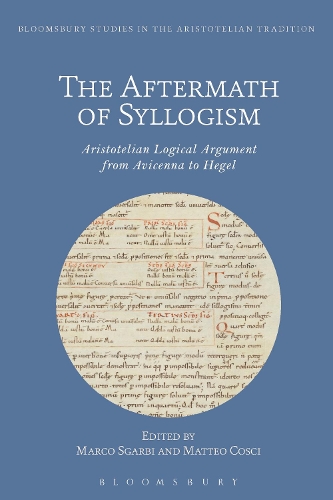
The Aftermath of Syllogism: Aristotelian Logical Argument from Avicenna to Hegel
(Paperback)
Available Formats
Publishing Details
The Aftermath of Syllogism: Aristotelian Logical Argument from Avicenna to Hegel
By (Author) Dr Marco Sgarbi
Edited by Matteo Cosci
Contributions by Stephen Gaukroger
Bloomsbury Publishing PLC
Bloomsbury Academic
25th July 2019
United Kingdom
Classifications
Tertiary Education
Non Fiction
Philosophy: logic
166
Physical Properties
Paperback
232
Width 156mm, Height 234mm
331g
Description
Syllogism is a form of logical argument allowing one to deduce a consistent conclusion based on a pair of premises having a common term. Although Aristotle was the first to conceive and develop this way of reasoning, he left open a lot of conceptual space for further modifications, improvements and systematizations with regards to his original syllogistic theory. From its creation until modern times, syllogism has remained a powerful and compelling device of deduction and argument, used by a variety of figures and assuming a variety of forms throughout history. The Aftermath of Syllogism investigates the key developments in the history of this peculiar pattern of inference, from Avicenna to Hegel. Taking as its focus the longue dure of development between the Middle Ages and the nineteenth century, this book looks at the huge reworking scientific syllogism underwent over the centuries, as some of the finest philosophical minds brought it to an unprecedented height of logical sharpness and sophistication. Bringing together a group of major international experts in the Aristotelian tradition, The Aftermath of Syllogism provides a detailed, up to date and critical evaluation of the history of syllogistic deduction.
Reviews
I enjoyed reading this book. It highlights a part of the theory's history that is less well known, and in some sense it is a history of a decline after the heights it reached in the 14th century. But it is nevertheless an interesting history, which sees the theory playing a somewhat different role, not as a formal logic, but as a theory of reasoning I recommend this volume to anyone interested in the history of the theory of syllogisms. * Notre Dame Philosophical Reviews *
This volumes main strength lies in its very approach to the history of syllogism, from Avicenna to Hegel. We are not talking of either the large scope of the history of philosophy or the narrow scope of the history of the notion of syllogism; we are talking of the reconstruction of a vital problem over seven centuries of history. We are talking, then, of real and effective Problemgeschichte. * Riccardo Pozzo, Professor, Department of Human Sciences, University of Verona, Italy *
To my knowledge, no work exists in English that compares to what The Aftermath of Syllogism achieves and contributes to this area of scholarship. * Seung-Kee Lee, Professor, Department of Philosophy, Drew University, USA *
Aristotle casts a long shadow over the history of philosophy. This is especially true of his doctrine of the syllogism, the idea that the core of logical reasoning comes in simple three-sentence arguments, Socrates is a man, all men are mortal, therefore Socrates is mortal. The history of logic well into the nineteenth century is the history of reactions to this conception of reasoning, for and against. In this excellent book, the editor has assembled a series of essays by distinguished scholars directed at moments of particular importance in the history of the syllogism, both advocates and opponents, from the medievals to the nineteenth century. The Aftermath of Syllogism is a very welcome addition to the literature on the history of logic. * Daniel Garber, Professor of Philosophy, Princeton University, USA *
Author Bio
Marco Sgarbi is Associate Professor of History of Philosophy at the Universit Ca' Foscari, Venice, Italy. Matteo Cosci is a postdoctoral researcher at the Universit Ca' Foscari, Venice, Italy, currently working within the ERC project "Aristotle in the Italian Vernacular: Rethinking Renaissance and Early-Modern Intellectual History (c. 1400c. 1650)".
